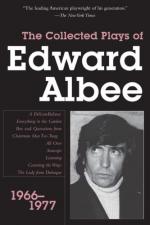|
This section contains 2,683 words (approx. 9 pages at 300 words per page) |

|
SOURCE: "Edward Albee: Conflict of Tradition," in Modern Drama, Vol. 10, No. 3, December 1967, pp. 274-79.
In the essay below, Knepler examines Albee's uneasy mixture of the American dramatic tradition, with its emphasis on rationality, causation, and explanation, with elements of the Theatre of the Absurd, with its stress on senselessness and incomprehension.
In The Introduction To His Excellent Collection American Playwrights on Drama Horst Frenz remarks, axiomatically, that "O'Neill never founded a school." He is right, of course, if one considers school to refer to the usual stylistic or structural elements of drama. In the Marlovian or Racinian sense O'Neill did not found a school. In the sense in which his work has become engrained in the American dramatic tradition, however, he did. I do not mean the rather facile, negative sense which Professor Frenz refers to in the same sentence: "O'Neill never founded a school, and the constant...
|
This section contains 2,683 words (approx. 9 pages at 300 words per page) |

|


